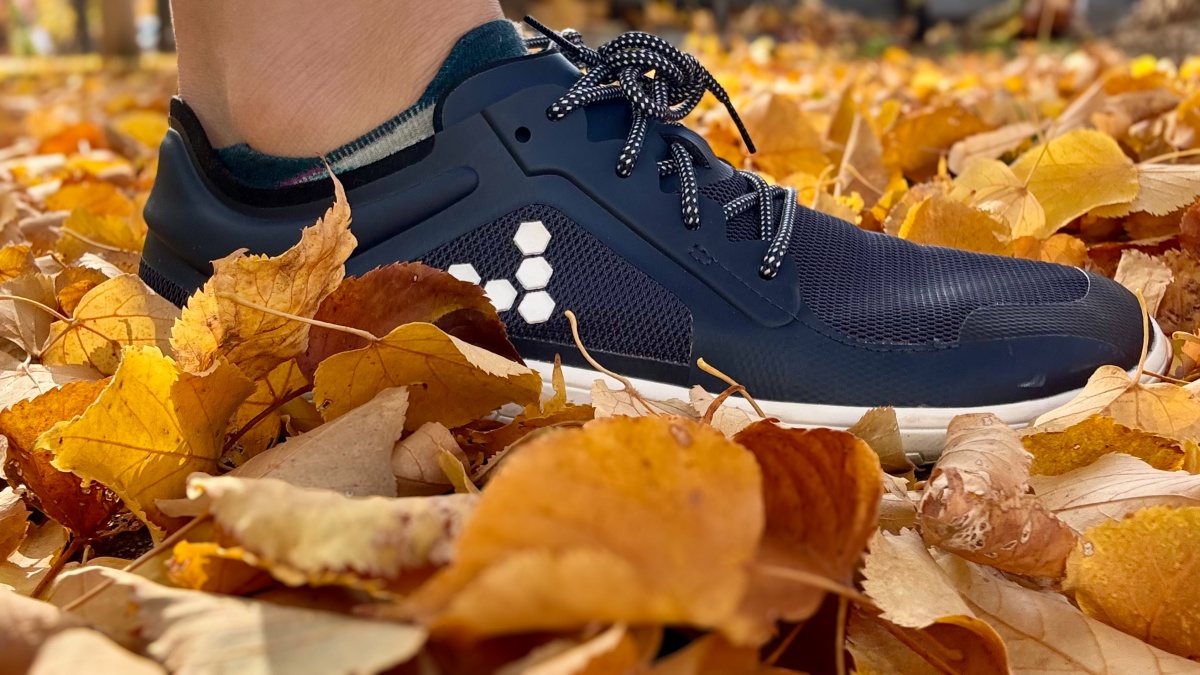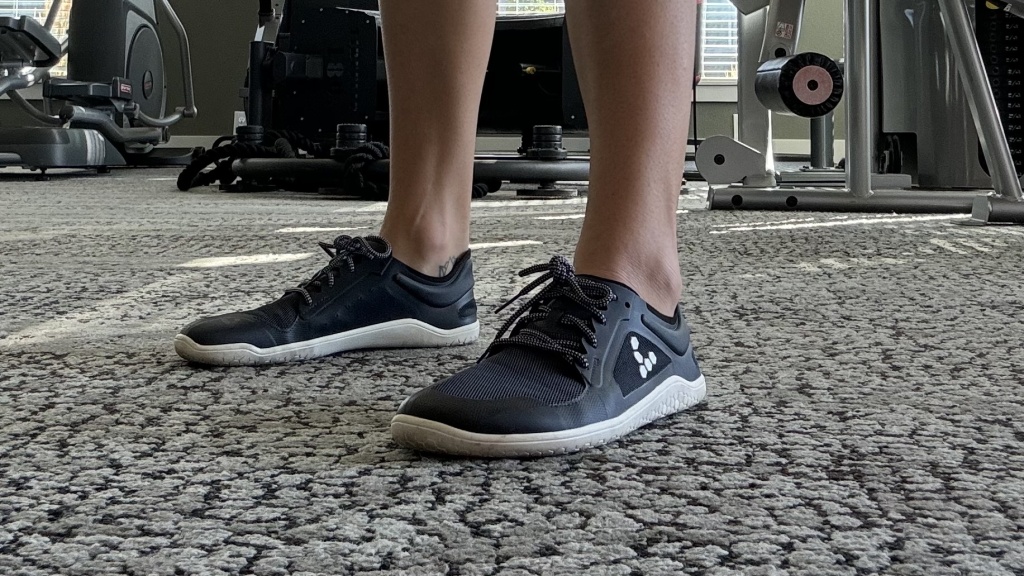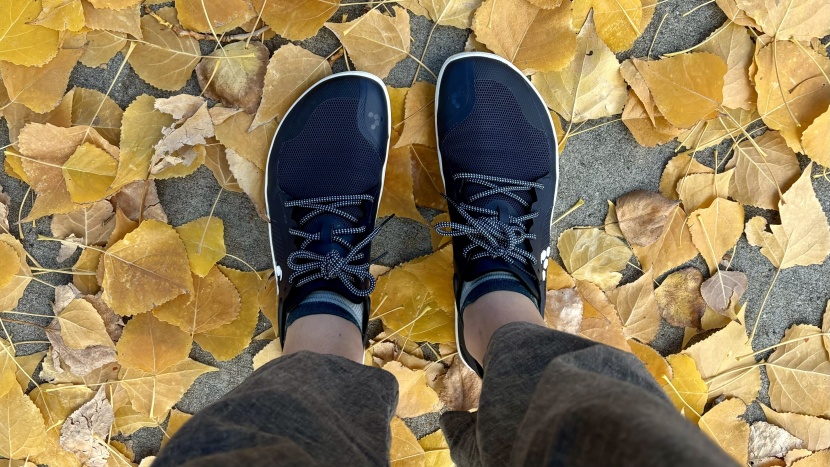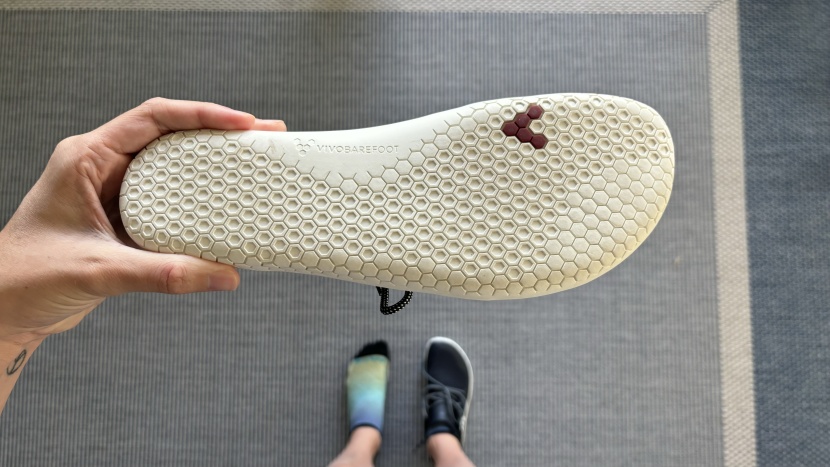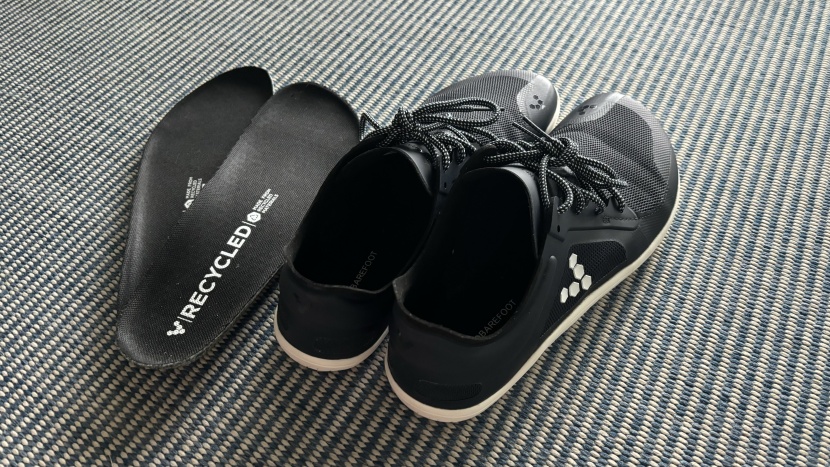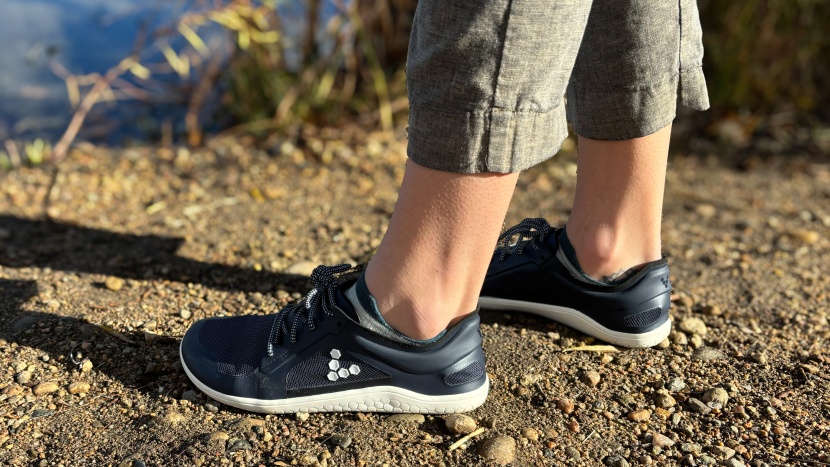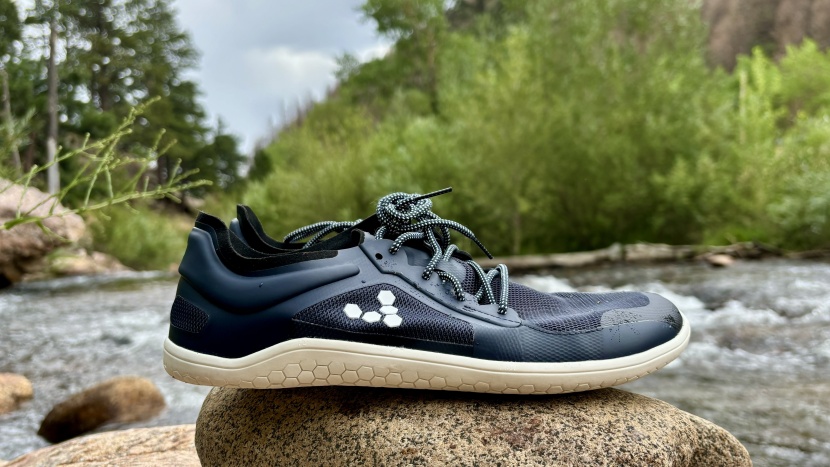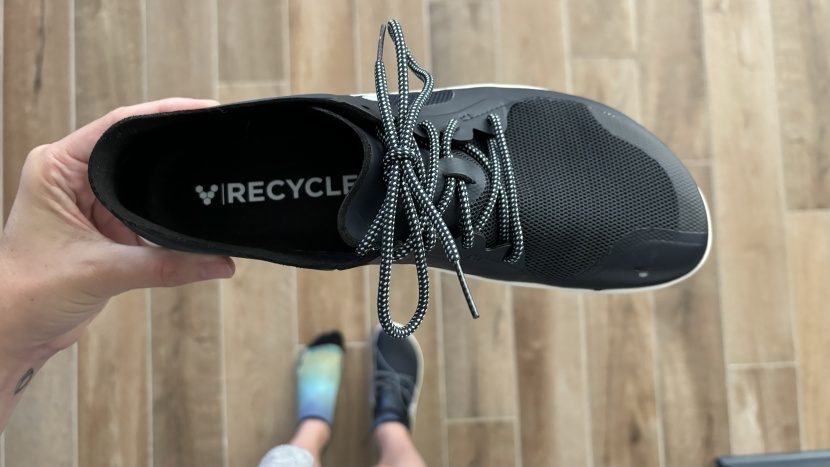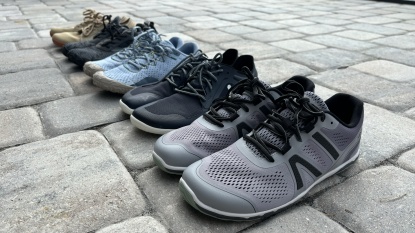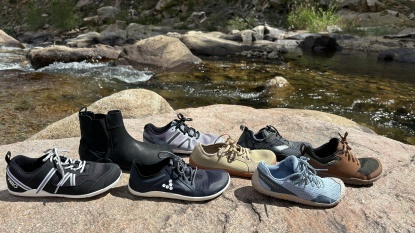Our Verdict
Compare to Similar Products
 This Product
Vivobarefoot Primus Lite III - Women's | |||||
|---|---|---|---|---|---|
| Awards | Best Barefoot Gym Shoe | Best Overall Women's Barefoot Shoe | Best Everyday Barefoot Shoe | Best Barefoot Running Shoe | Best Barefoot Shoe on a Budget |
| Price | $107.37 at Amazon Compare at 2 sellers | $69.96 at Backcountry Compare at 3 sellers | $120 List | $79.95 at Amazon Compare at 2 sellers | $50 List $41.99 at Amazon |
Overall Score  |
|||||
| Star Rating | |||||
| Bottom Line | These shoes are our gym shoe go-to thanks to their small stack height and stable base | This is everything we want in a barefoot shoe, thanks to its flexible, zero drop sole and wide toe box | Athletic shoes aren't always needed for the day-to-day and that is where these stylish and comfortable shoes shine | While they are great for more than just running, we appreciate the traction when picking up the pace | These are a great place to start if you've never worn barefoot shoes, but they are also a great budget-friendly option for those used to the style |
| Rating Categories | Vivobarefoot Primus... | Merrell Vapor Glove... | Lems Primal Zen - W... | Xero Shoes HFS II -... | Whitin Minimalist -... |
| Ground Feedback (30%) | |||||
| Stability (20%) | |||||
| Traction (20%) | |||||
| Weight (15%) | |||||
| Durability (15%) | |||||
| Specifications | Vivobarefoot Primus... | Merrell Vapor Glove... | Lems Primal Zen - W... | Xero Shoes HFS II -... | Whitin Minimalist -... |
| Stack Height | 7 mm | 6 mm | 9.5 mm | 8.5 mm | 12 mm |
| Measured Weight (per pair, US 9) | 14.5 oz | 10.4 oz | 15.3 oz | 14.2 oz | 17.1 oz |
| Heel to Toe drop (mm) | 0 mm | 0 mm | 0 mm | 0 mm | 0 mm |
| Outsole | Priumus rubber | Vibram | LemsRubber | FeelTrue rubber | Rubber |
| Upper Material | RPET, polyester, PU | Mesh, polyester | Microfiber and mesh | Polyester fabric | Knit |
| Removable Insole | Yes | No | Yes | Yes | Yes |
| Width Options | Regular | Regular | Regular | Regular | Regular |
| Style | Barefoot road | Barefoot trail | Barefoot road | Barefoot road | Barefoot road |
Our Analysis and Test Results
The Vivobarefoot Primus Lite collection is a classic in the barefoot world, and we understand why. These shoes are low to the ground and very wide, making us feel very stable. They have one of the lowest stack heights of the bunch, especially when the insole is out, and we felt just about everything underfoot. We specifically like these for gym use due to their traction being best suited for indoor use.
Ground Feedback
Of all the shoes in our lineup, the Vivobarefoot Primus Lite has the most sensitive underfoot feel. We dare say the underfoot feel is the closest to having no shoes on, especially without the insole. The shoes have just seven millimeters of stack with the insole. Without, this breaks down to two millimeters of “lug” height and two millimeters of outsole. We could feel pretty much everything we stepped on, from small pebbles and twigs to sidewalk cracks. So much so that sometimes jagged rocks would cause a mildly sharp sensation underfoot. This was never painful, per se, but it was enough to bring our attention to our feet.
The Primus Lite took the most time to get used to. The fit is just so minimal. Even from other barefoot shoes to this one, we felt a little awkward walking in them at first. Because they feel so barefoot but aren't, we could feel the ground hit fast, but it was followed by an unexpected “flop” with the rest of the shoe. This quickly resolved itself within a few wears. However, if you find yourself feeling a little off in your first few outings with these, just know that even our barefoot experts had a tough time feeling these out. Rest assured that the adjustment period quickly fixes itself.
Stability
During our testing, we wore the Vivobarefoot on many outings. We aimed to figure out where these shoes shone and where they weren't the best. Stability is a key factor in this, as some shoes excel in some environments but lack in others. For the Primus Lite, we think these shoes excel in indoor situations and at the gym. The synthetic leather is thicker as it wraps around the ankle, securely locking your foot within the shoe. Our ankles didn't move up and down as we walked in this shoe, even with the laces loosened. The shoe itself moved with our movement, flexing and folding as we made our way through a high calisthenics workout.
The Primus Lite III is among the most stable-feeling shoes in the lineup. Much of this is due to the very small stack height and wide base. We felt very secure in these shoes in the right environment. For activities like weightlifting, its important to have a solid base, and lifting barefoot or in barefoot shoes is becoming more and more popular. The Vivobarefoot is a great option for this if you opt for a shoes-on approach. These shoes could work as a running shoe for someone who is very experienced in barefoot running, but those new to the style will need a very gradual running plan. Our only gripe with the shoe in this aspect is with the less boxy toe box. The toe box begins tapering much sooner than other options in the lineup. Our lead tester with a more square-shaped foot had pinky toe contact with the side of the shoe while the insole was in. However, removing the insole provided just enough room to relieve this problem.
Traction
Traction is not where this shoe shines, unfortunately. The shoes are great indoors and on dry concrete. However, anything else feels risky. We understand that some barefoot shoe wearers get confident enough to wear low tread options like these on hardpack trails, but we didn't think they were the best option in our lineup for that. We took these on a flat trail that had freshly been rained on. While we didn't have any major slips, we had a few uneasy moments stepping on rocks that were roughly fist-sized. These shoes were situationally good for us, and indoor surfaces are where we found them to do best.
The rubber outsole features two-millimeter “lugs.” However, these lugs aren't much, and we wouldn't trust them on loose or wet ground. The rubber itself is small and responds well to indoor surfaces. The rubber stuck well to rubber gym floors, and we felt confidently attached to the floor during our workouts. This, along with the wide base, is much of the reason why we enjoyed these for indoor use. While they will likely do fine for quick walks from your car to the building, we recommend another shoe if you spend a substantial amount of time outdoors and not on dry concrete. If you don't have good traction, you likely won't feel all that stable on trails, for example, even if you have a very wide shoe.
Weight
Barefoot shoes are usually very light. They don't have a lot of materials and most often skip the midsole altogether. Some shoes, like the Vivobarefoot have optional insoles. If you are really trying to save weight or want the most barefoot feel, you can ditch these insoles. These shoes are lightweight, but they also feel light on the feet. They fit almost like a slipper, ending up nearly unnoticeable after the first few wears.
Being one of the most minimal shoes in the lineup, it's no surprise that they weighed so little. The Primus Lite weighs just 14.5 ounces for the pair. The upper is made from Recycled Polyethylene Terephthalate (RPET), polyester, and Polyurethane (PU). The toe box is mesh-like and airy and extends up into the tongue. This feature not only saves weight but kept our feet cool on summer days. The outsole is natural rubber and because there is so little of it, it doesn't weigh a whole lot.
Durability
The Primus Lite III is surprisingly durable for how minimal they are. They have only two millimeters of tread, and we expected to see more wear on this. However, the two millimeters of tread appeared to stay the same throughout the testing cycle. Likewise, the synthetic upper held up great. We wiggled our feet in and out of these shoes, pulling on the heel tab to help us out, and the shoes never gave way.
It is worth remembering that these shoes are best for urban and indoor use. So, the wear and tear that come from outdoor environments shouldn't be a factor. Still, we took these shoes to the river and on light trails and they held up well. We shuffled against rocks and trees, and, impressively, we didn't have any signs of wear that was out of the ordinary. However, we did find the outsole to pick up dirt stains quickly and hard to remove.
Should You Buy the Vivobarefoot Primus Lite III?
The Primus Lite III is a classic barefoot shoe, and for good reason. They have one of the most barefoot feels that we have tested. They are lightweight, minimal over the foot, and have a very small stack height. If you are after the most barefoot shoe on the market, these are worthy of your consideration. These are also an excellent choice for weightlifting and high-intensity gym workouts. However, for many of the reasons mentioned, they aren't the best for those new to the style. They can feel a bit aggressive if you have never worn a barefoot shoe before, though the insole helps. They still might be worthy of a spot in your closet if you are willing to slowly break in to the shoe. Additionally, we don't suggest these for hiking or frequent outdoor activities due to the lack of traction.
What Other Barefoot Shoes Should You Consider?
If you find yourself on the trails often, you'll need a shoe that has better traction. For that, we suggest the Merrell Trail Glove 7. This shoe features a Vibram outsole that is sticky on most surfaces. These shoes have a large stack height, so if you are new to barefoot shoes, this is a great place to start. We also love the Lems Primal Zen for those new to barefoot-style shoes. These have a more casual look for day-to-day wear, and include a removable insole for easy transition.


